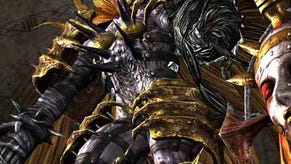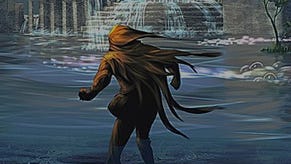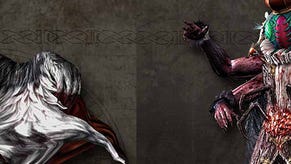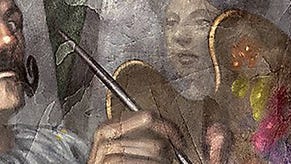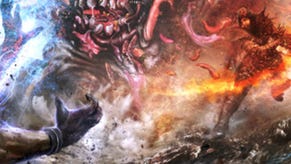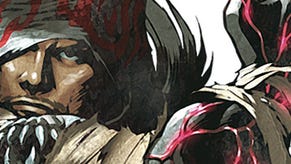E3 2012: Inafune on Soul Sacrifice, life post-Capcom
Keiji Inafune's first big project since leaving Capcom was recently revealed to be Soul Sacrifice, a "reality based fantasy" title for Vita. He talked to Jem Alexander at E3 about drawing inspiration from personal life experiences.
"I've lived a fairly long time and have a long experience in the games industry. I have had success and failure and I have realised that when something succeeds, there is always a sacrifice behind it. When you're creating a great game, you have to work long hours and you can't go home and you're sacrificing your personal life and time in order to get that great game as an outcome. I have experienced a lot of that in my real life."
What is Soul Sacrifice? Why is this your first major project since leaving Capcom?
Keiji Inafune: I wanted to create a multiplayer action RPG. Not just a typical action game, but something that involves a lot of multiplayer. Soul Sacrifice is a fantasy based game, but it's a "realistic fantasy". The theme of the game is sacrifice. In order to obtain power you are required to make sacrifices. You will have to make choices to sacrifice yourself or your friends, for example. How much are you willing to pay to obtain a certain power? These choices will happen often, so it's a big theme for Soul Sacrifice.
As for why it's my first big project since leaving Capcom, when I made the choice to leave the company I wanted to create a game that I really wanted to make as a creator. I have been coming up with different game concepts since leaving Capcom and that was around the time that Sony launched the PlayStation Vita. I felt that, of the concepts I had come up with, Soul Sacrifice best matched the Vita platform. That's when I brought the idea to Sony and luckily it was a good match to Sony's strategy. That's how the project came to life.
In what ways does the game take advantage of the Vita?
I feel that the Vita has the highest hardware spec for a handheld platform. I wanted to create a realistic fantasy game and it's good to have that high spec. It's also good for multiplayer. I want everybody to play this game in multiplayer and the Vita is great for both online and ad-hoc play. It's a good match.
How exactly does the sacrifice mechanic work in Soul Sacrifice?
Every time you encounter these choices - when you're dying, when your friend is dying, when an enemy is dying - you are asked to either save or sacrifice. If you're fighting a monster and he dies, you are asked to make that choice. You see this everywhere within the game. When your friend is dying you are asked to save or sacrifice. Ultimately you can sacrifice yourself as well. Depending on which choices you make, it will affect the way you look. It's a kind of customisation. You can look angelic or demonic. As you play on and make more choices, it will affect your appearance. It's sort of like real life. It's like your personality. If you keep doing bad things to your friends, you can appear really evil in real life too.
What was the inspiration behind using sacrifice as a theme for this game?
I've lived a fairly long time and have a long experience in the games industry. I have had success and failure and I have realised that when something succeeds, there is always a sacrifice behind it. When you're creating a great game, you have to work long hours and you can't go home and you're sacrificing your personal life and time in order to get that great game as an outcome. I have experienced a lot of that in my real life. When I left Capcom I realised how much protection I had at a big company and I have come to realise how sometimes you might be vulnerable. That's when I had the idea of incorporating my real life experience into the game system. I thought it would be interesting to illustrate that reality. In everyday life you are sacrificing something in order to get something.
How difficult was it to build a usable game mechanic around that?
It's fairly easy to come up with the concept. I had a strong concept to begin with and you then have to build that into the game system. Of course, my great team are the ones who do the actual work. I spent a lot of time making sure every single one of my staff understands the concept. Once it's incorporated into the game it could have been too rigid. In that case, the soft emotional essence may get lost. I spent a lot of time working together with my staff to make it balanced. Making it into a game, but without losing that emotion.
How does the collaboration between yourself, MarvelousAQL and Sony Japan Studio work?
I have learnt during my long years of game creation that it is essential to have good teamwork. Myself and the Comcept team, the MarvelousAQL team and the Japan Studio team all work closely together. We have good communication. It is essential that no one party overtakes another. We are different entities, but one team. The collaboration is working really well and I am proud to have that team in place.
Why is it necessary to have these different companies all working on the game?
It has always been my belief that just having one idea is weak. I have been saying this since my Capcom days. I feel it's important to bring different ideas and visions into a group. It is hard to get everybody to look the same way when they have different visions, but having different views is something that makes the team stronger. I have always tried to work with different people from different cultures. In this situation I feel that bringing in the different entities is very important because it is a collection of different views and visions and this will lead to greater success.
Some have compared Soul Sacrifice to Demon's Souls and Dark Souls in terms of tone and style. How do you feel about this and did you draw any inspiration from these games?
Although I believe that both of those titles are great games, it was not intentional. I didn't even think about it. I only thought about the concept of my own game, where the theme was to sacrifice. When you sacrifice things, they naturally get dark. The title is also quite close, but that was not part of the plan either.
Can you explain what a "reality blended experience" is and how it works in Soul Sacrifice?
"In reality you have to pay a price. You need to work at something in order to get better. That’s the reality essence that I am talking about. In this game you’re in a fantasy world, but nothing is a given. You have to work at it or pay the cost or give something up in order to get power. That’s what I wanted to convey and that’s why we call it a reality blended fantasy."
If you take a fantasy game and you see a sorcerer, you automatically think that he can use magic without having to give anything in exchange. If you see a swordsman, you know he's good at slashing monsters. That's a given. But, if you think about reality, you don't just start as an expert swordsman. In reality you have to pay a price. You need to work at something in order to get better. That's the reality essence that I am talking about. In this game you're in a fantasy world, but nothing is a given. You have to work at it or pay the cost or give something up in order to get power. That's what I wanted to convey and that's why we call it a reality blended fantasy.
How has leaving Capcom affected the way you approach games development, if it has?
Looking back at what I was doing at Capcom, as a game creator, I could probably do the same thing now. It hasn't really affected that. I can't use Capcom IP, but I can create something from scratch in the same way. Now that I don't work for a games publisher, I can do different challenges. Things that are non-games. By working on different non-game projects, there are new experiences that I learn in those fields that translate back into games and expand what I can do. I feel that the challenges and possibilities have expanded. I am happy.
How do you personally feel about the current state of the Japanese games industry?
I've said a lot that I feel that western game developers are very successful and are making great games, as opposed to Japan where that is not happening too much. Every year I feel that gap between them expanding. I've been saying this for years, but probably since last year I feel that Japanese developers are finally realising that sense of fear. Of being left behind in the gaming world. Admitting to that state is one good step. As I've been saying, it's important to work together and bring in different essences from different cultures. Working with non-Japanese developers would definitely make things better for Japan because they would finally learn to take in these essences from different cultures. I feel it's important for the Japanese games industry to do this in order to grow back up to their previous level.
What non-Japanese games developer would you most like to work with in the future?
There are many, many companies that I would like to work with. There are companies that come up with really great games in the Western world. Not necessarily just the top-tier companies. I know that there are companies that belong to the lower tiers, but which are rising. They are working on great games. There are definitely lots of companies that I would like to work with and learn from. It's really exciting.
No specific names?
I didn't name any specifics because while there are a lot of companies I'm interested in. I look at Uncharted and Naughty Dog and the game looks great, but I wouldn't know until I meet them in person what the best match is or what the chemistry there is. I'm excited to meet different developers. I'm open to that.
Soul Sacrifice release on Vita in Japan this year. No western launch window has been touted.




